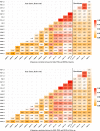Assessing psychometric properties and measurement invariance of the Sleep Quality Questionnaire among healthcare students
- PMID: 38243256
- PMCID: PMC10799451
- DOI: 10.1186/s40359-023-01276-2
Assessing psychometric properties and measurement invariance of the Sleep Quality Questionnaire among healthcare students
Abstract
Objective: The sleep of healthcare students is worth discovering. Mental health and self-rated health are thought to be associated with sleep quality. As such, valid instruments to assess sleep quality in healthcare students are crucial and irreplaceable. This study aimed to investigate the measurement properties of the Sleep Quality Questionnaire (SQQ) for Chinese healthcare students.
Methods: Two longitudinal assessments were undertaken among healthcare students, with a total of 595, between December 2020 and January 2021. Measures include the Chinese version of the SQQ, Patient Health Questionnaire-4 (PHQ-4), Self-Rated Health Questionnaire (SRHQ), and sociodemographic questionnaire. Structural validity through confirmatory factor analysis (CFA) was conducted to examine factor structure of the SQQ. T-tests and ANOVAs were used to examine sociodemographic differences in sleep quality scores. Multi Group CFA and longitudinal CFA were respectively used to assess cross-sectional invariance and longitudinal invariance across two-time interval, i.e., cross-cultural validity. Construct validity, internal consistency, and test-retest reliability were correspondingly examined via Spearman correlation, Cronbach's alpha and McDonald's omega, and intraclass correlation coefficient. Multiple linear regression analysis was performed to examine incremental validity of the SQQ based on the PHQ-4 and SRHQ as indicators of the criterion variables.
Results: CFA results suggested that the two-factor model of the SQQ-9 (item 2 excluded) had the best fit. The SQQ-9 scores differed significantly by age, grade, academic stage, hobby, stress coping strategy, anxiety, depression, and self-rated health subgroups. Measurement invariance was supported in terms of aforesaid subgroups and across two time intervals. In correlation and regression analyses, anxiety, depression, and self-rated health were moderately strong predictors of sleep quality. The SQQ-9 had good internal consistency and test-retest reliability.
Conclusion: Good measurement properties suggest that the SQQ is a promising and practical measurement instrument for assessing sleep quality of Chinese healthcare students.
Keywords: Assessment instrument; Healthcare students; Measurement properties; Observational longitudinal study; Sleep Quality Questionnaire.
© 2024. The Author(s).
Conflict of interest statement
The authors declare no competing interests.
Figures

Similar articles
-
Longitudinal measurement invariance and psychometric properties of the Patient Health Questionnaire-Four in China.BMC Psychiatry. 2024 Jul 22;24(1):517. doi: 10.1186/s12888-024-05873-2. BMC Psychiatry. 2024. PMID: 39039478 Free PMC article.
-
A longitudinal examination of the measurement properties and invariance of the Sleep Condition Indicator in Chinese healthcare students.BMC Psychiatry. 2024 Jul 22;24(1):518. doi: 10.1186/s12888-024-05844-7. BMC Psychiatry. 2024. PMID: 39039484 Free PMC article.
-
Adaptation and validation of the Chinese version of the Sleep Quality Questionnaire.Qual Life Res. 2023 Feb;32(2):569-582. doi: 10.1007/s11136-022-03241-9. Epub 2022 Sep 20. Qual Life Res. 2023. PMID: 36125602
-
The RU_SATED as a measure of sleep health: cross-cultural adaptation and validation in Chinese healthcare students.BMC Psychol. 2023 Jul 5;11(1):200. doi: 10.1186/s40359-023-01203-5. BMC Psychol. 2023. PMID: 37408014 Free PMC article.
-
Validity evaluation of the Health Information Preferences Questionnaire among college students.Front Public Health. 2024 Mar 27;12:1249621. doi: 10.3389/fpubh.2024.1249621. eCollection 2024. Front Public Health. 2024. PMID: 38601501 Free PMC article. Review.
Cited by
-
Assessment of psychometric performance for the Chinese version of the Brief Inventory of Perceived Stress integrating exploratory graph analysis and confirmatory factor analysis.Qual Life Res. 2024 Sep;33(9):2453-2463. doi: 10.1007/s11136-024-03681-5. Epub 2024 Jul 15. Qual Life Res. 2024. PMID: 39008142
-
Development of the psychopathological vulnerability index for screening at-risk youths: a Rasch model approach.Npj Ment Health Res. 2024 Dec 2;3(1):60. doi: 10.1038/s44184-024-00106-6. Npj Ment Health Res. 2024. PMID: 39623039 Free PMC article.
-
Changes in Physical Function, Cognitive Function, Mental Health, and Sleep Quality After Cardiac Surgeries and Procedures.Nurs Rep. 2025 Jun 11;15(6):209. doi: 10.3390/nursrep15060209. Nurs Rep. 2025. PMID: 40559500 Free PMC article.
-
Longitudinal measurement invariance and psychometric properties of the Patient Health Questionnaire-Four in China.BMC Psychiatry. 2024 Jul 22;24(1):517. doi: 10.1186/s12888-024-05873-2. BMC Psychiatry. 2024. PMID: 39039478 Free PMC article.
-
A longitudinal examination of the measurement properties and invariance of the Sleep Condition Indicator in Chinese healthcare students.BMC Psychiatry. 2024 Jul 22;24(1):518. doi: 10.1186/s12888-024-05844-7. BMC Psychiatry. 2024. PMID: 39039484 Free PMC article.
References
-
- Kline C: Sleep quality. In: Encyclopedia of Behavioral Medicine. edn. Edited by Marc D. Gellman JRT; 2013: 1811–1813 10.1007/978-1-4419-1005-9_849.
MeSH terms
Grants and funding
LinkOut - more resources
Full Text Sources
Research Materials

